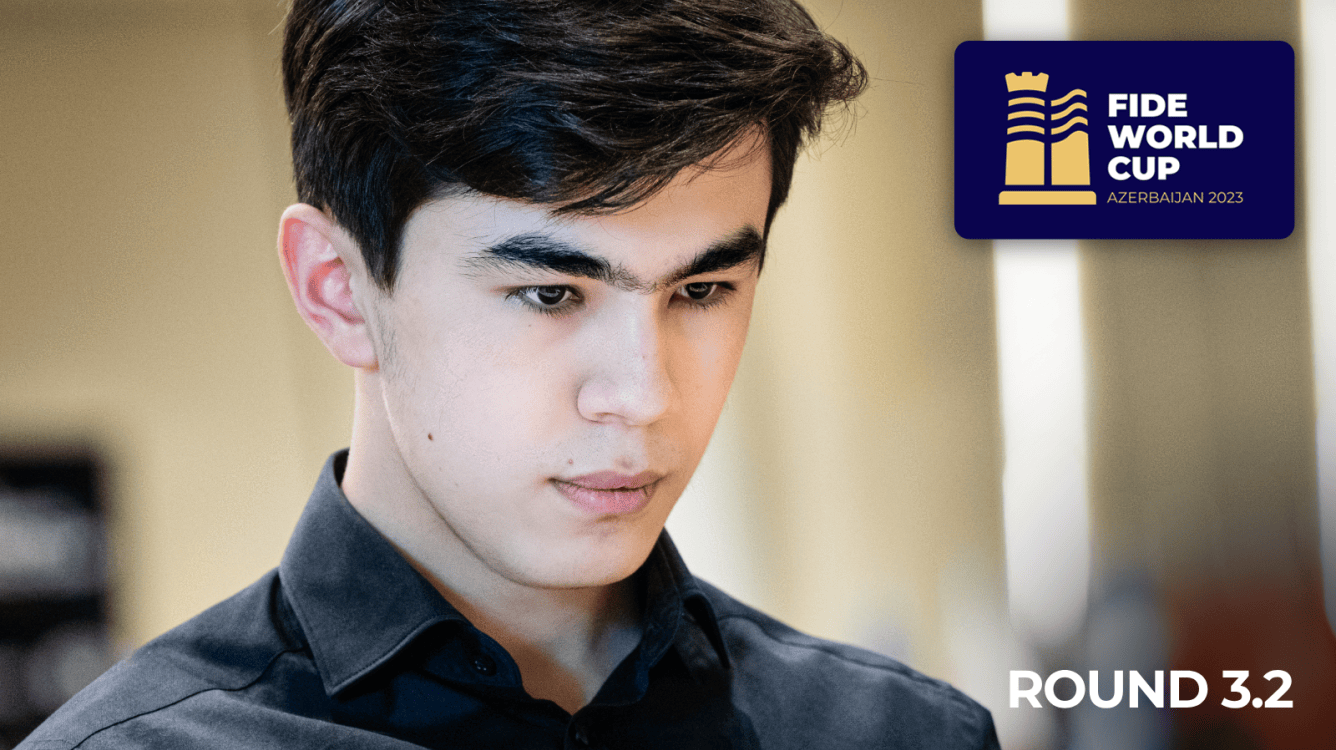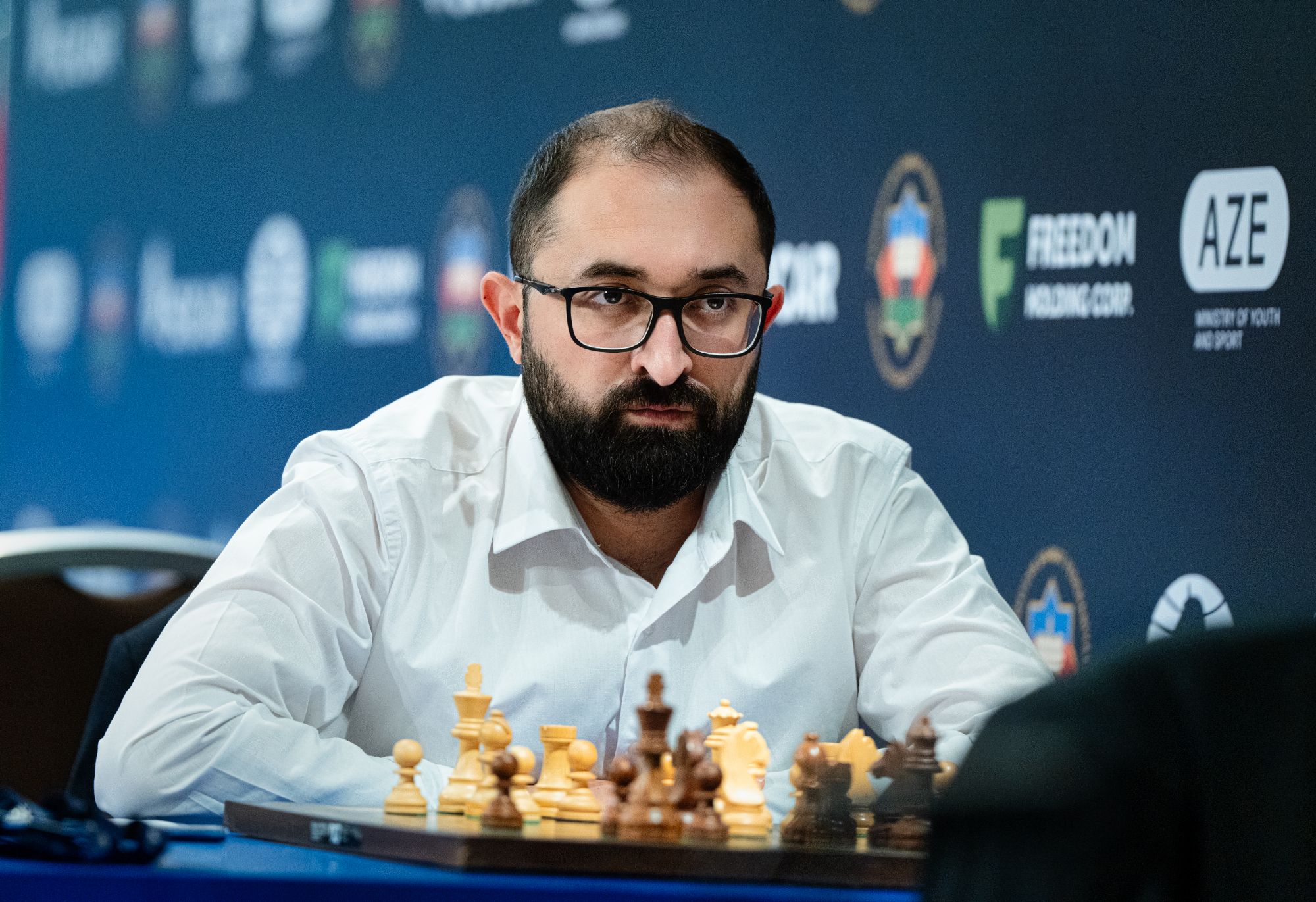
MVL Exits World Cup; Close Calls For Caruana, Ju
In a dramatic affair, GM Javokhir Sindarov knocked GM Maxime Vachier-Lagrave out of the 2023 FIDE World Cup in the second game of round three, while GM Fabiano Caruana and Women's World Champion GM Ju Wenjun came dangerously close to exiting the event.
GMs Jorden van Foreest, Radoslaw Wojtaszek, and Bardiya Daneshvar proved that match comebacks are not impossible, but many other players failed to win on demand. IM Eline Roebers maintained her perfect score in a tactical slugfest, as just four matches in an exciting Women's section move to tiebreaks.
Tiebreaks for round three begins on Monday, August 7, at 7 a.m. ET / 13:00 CEST / 4:30 p.m IST.
The first hour of Sunday's games was a peaceful affair that gave little indication of the drama that would later ensue. Grandmasters shook hands for draws, preferring their chances in tiebreaks, but once the excitement started, no game's outcome was guaranteed until the scoresheets were signed.
When the dust settled, 13 players in the Open section had advanced to the fourth round, while the other 38 players will need to fight for their places in the final 32. Only eight players in the Women's section remain uncertain of their fate; the other 12 players have two rest (or preparation) days before they return to the board.

- Open Section: A little bit of everything
- Women's Section: Miraculous escapes, but no match comebacks
Open Section: A little bit of everything
In the words of a bewildered Naroditsky: "What haven't we seen today?" Some games were smooth sailing, others abruptly changed course, and several experienced wild ups and downs that kept spectators on the edges of their seats. It was clear that in the World Cup's unforgiving format, chess skill sometimes takes a back seat to tension, and players need iron nerves to progress in the competition.
GM Alexey Sarana was the first player through to round four with little to complain about as he got his exact preparation against GM Kirill Shevchenko and capitalized on a blunder to get the full point. GM Benjamin Gledura played well with the black pieces against GM Hikaru Nakamura but used too much time and failed to find the precise moves needed to hold the draw. Nakamura explains his thoughts on the game below.
In round four, Nakamura will meet GM Praggnanandhaa Rameshbabu, who had less of a smooth road to his third-round victory. Praggnanandhaa needed a draw with the black pieces against GM David Navara to avoid tiebreaks, but Navara was not going down without a fight. An unorthodox opening led to a complicated middlegame where players took turns having the advantage until it looked as though all hope was lost for Navara.
Black's advantage faltered as Praggnanandhaa missed a check, and suddenly Navara was back in the game after further missteps by his opponent. Unfortunately for Navara, his "back in the game" was limited to a draw, as he was given no further chances.
GM Magnus Carlsen was another player to advance with a draw after a win in game one, but similar to Navara-Praggnanandhaa it wasn't the smoothest of games. GM Aryan Tari surprised with 4.g4 against Carlsen's Caro-Kann and looked to be adopting an "all-in" approach which afforded him some winning chances. Even though Tari was down on the clock, it was surprising that he didn't spend more time in critical moments, seemingly shutting down any chances he had for a win.
In fact, Carlsen ended up better toward the end of the game but uncharacteristically didn't capitalize or continue playing for a win. Possibly he was still rattled by Tari's opening choice, or else he was keeping things amicable between friends, but in any case a draw was all he needed to progress.
The engine never swung in GM Amin Tabatabaei's favor in game two as GM Vincent Keymer moved on with a 2-0 score to face Carlsen, while GM Rasmus Svane had no difficulty getting the draw he needed to eliminate GM Jingyao Tin. GM Alexander Donchenko needed a win against GM Maghsoodloo Parham but was unable to convert the edge he obtained in the middlegame and will be going home as a result.
GM Daniele Vocaturo cemented his upset victory over GM Daniil Dubov by accepting a draw to get a guaranteed match win instead of risking tiebreaks by pushing for a 2-0 victory in a position where he had an advantage, but both queens were still on the board.

Van Foreest pulled out all the stops to win his game and force GM Peter Svidler to tiebreaks, while Daneshvar built up an enormous advantage to level the score in his match against GM Saleh A.R. Salem. No player wants to be in a must-win situation with the black pieces, but Wojtaszek handled his situation with class after Saturday's unfortunate loss and lives to fight on in the tiebreaks, where his opponent GM Ivan Schitco will be looking to cause another upset.
GM Gadir Guseinov fought valiantly in his must-win game against GM Leinier Dominguez Perez and built up a completely winning position. In what must have felt like a repeat of Saturday's game, a one-move blunder destroyed all of Guseinov's hard work; this time he was left with a draw, but it was enough to bring his World Cup journey to an end.

In a big upset and exciting game, Sindarov dispatched Vachier-Lagrave. Sindarov showed impressive preparation, and it seemed like Vachier-Lagrave had successfully navigated his way through the complications until he snatched Black's bishop on d4. He likely realized something was amiss when Sindarov didn't immediately recapture. Although both players still had to be careful, Sindarov had no difficulty converting the game.
Two players to score wins with the black pieces were GMs Ray Robson and Arjun Erigaisi. Robson lost much of his advantage in mutual time trouble against 2022 World Junior Champion GM Abdulla Gadimbayli but was able to claw back and emerge victorious in the end. Although time trouble played less of a role in Arjun's game, he similarly lost a lot of his earlier advantage before regaining it to send GM Vladimir Fedoseev packing. Arjun will face Sindarov in the next round.
GM Dommaraju Gukesh wasn't in a must-win situation, but he won't be complaining about his victory that is our Game of the Day, annotated below by GM Rafael Leitao.
Many players who had drawn their first games opted to play calmly in their next games and settle things in tiebreaks. But not everyone who drew their second games can describe them as calm ones. In particular, the Caruana and GM Mustafa Yilmaz game likely had heart rates spiking across the world, and one can only imagine how the players felt.

After Caruana's massive blunder in the previous game, it seemed like he was just playing safely with the black pieces and would have been happy with a draw if he wasn't given chances. For the first 20 moves, the game was equal, then Caruana had a bit of an edge. As the broadcast team tuned in, Caruana suddenly started to make moves that handed Yilmaz an easy attack.
With a rook on g3 and potential game-ending tactics, Yilmaz had everything going for him, and it looked like Caruana would leave the World Cup in round 3.2, as he did in 2021. But then Yilmaz inexplicably dropped a pawn, and it was Caruana with a big advantage. Yilmaz found what Caruana likely viewed as the best defense, and the players agreed to a draw in a position where Caruana was winning if he could find a queen sacrifice in his remaining seven minutes.
Caruana will likely just be relieved to make it through to tiebreaks, and we will see if he manages to avoid being haunted by his two classical games against Yilmaz in order to make it to round four.

All Games - Open Round 3.2
Women's Section: Miraculous escapes, but no match comebacks
The decisive results in game one meant that seven of the 16 games were must-wins, and this proved an insurmountable task for all the players who had lost their first games.
IM Vaishali R was given a few fleeting opportunities to seize an edge over GM Mariya Muzychuk but used 22 of her extra 30 minutes on her 42nd move. From there things just got worse as she didn't have time to figure out which moves gave her the best chances of a comeback.

IM Alina Bivol had no hope against IM Medina Warda Aulia, who found a bishop sacrifice on h7 that handed her a winning advantage. A small consolation for Bivol is that Aulia decided to go the safe route with a perpetual check instead of playing on for a win. In the post-game interview, Aulia said it was in line with her strategy of reaching the next round and that she'd seen the perpetual check when she had decided to sacrifice her bishop.
IM Nurgyul Salimova picked up a 2-0 victory to send home WGM Mary Ann Gomes, who can still be proud of her performance which involved a huge upset win over GM Kateryna Lagno. GM Bela Khotenashvili drew comfortably to win her match against IM Meri Arabidze, while fellow Georgian GM Nino Batsiashvili might usually be upset with her squandered winning chances against GM Xue Zhao, but fortunately, she needed only a draw to move on.

In a 59-move game where both players achieved close to 99 percent accuracy, it was impossible for WGM Divya Deshmukh to create the complications she needed to level the score with GM Aleksandra Goryachkina; therefore, Goryachkina moves on to the next round as yet undefeated in classical games.
Needing a win, IM Klaudia Kulon declared her intentions early by launching her pawns toward Roebers' king. While other players needing just a draw with the black pieces might play safe, Roebers struck back and a messy game ensued. In a position where engine evaluation could be completely disregarded, it was eventually Kulon who made the first big mistake, and Roebers was able to remain the only player in either section with a perfect score.
6⃣ games
— Chess.com (@chesscom) August 6, 2023
6⃣ wins
Eline Roebers is the only player across both the Open and Women's #FIDEWorldCup tournaments to still have a 100% record! 👏 pic.twitter.com/ZnwhIOBjQr
In a devastating turn of events for GM Anna Ushenina, who failed to win her previous game despite an enormous and persistent advantage, she slipped up with 23...Kg7? 24.Nxg5 Nxg5 against GM Anna Muzychuk, who speculated the previous day's game may have affected Ushenina's play. Muzychuk advances to a family affair in round four but has two days to prepare herself for it.
Can you find Muzychuk's win after Ushenina's 24...Nxg5?
Another surprise exit after a quiet first round was by GM Irina Krush at the hands of IM Polina Shuvalova after a chaotic opening where Krush was fine until she grabbed a pawn on a7 and Black's pieces crowded Krush's king and strangled her pieces. GM Humpy Koneru showed her class as she won a game where she was never in trouble against IM Olga Badelka, and GM Elisabeth Paehtz was correct to feel confident with the black pieces against IM Bibisara Assaubayeva, as Paehtz showcased her endgame technique to knock out Assaubayeva.

The two last games to finish came close to having two of China's top women knocked out. GM Tan Zhongyi narrowly escaped with a draw against Estonian IM Mai Narva, who led for most of the game but couldn't find the correct way forward in an endgame as both players played on increment. The draw takes the two players to tiebreaks, where Tan will hope her experience prevails.

In possibly the most excruciating game of the round, Women's World Champion Ju fought for her life against IM Ulviyya Fataliyeva. Although Ju usually prefers positions with a solid pawn structure, she opted for fractured pawns and seemed to be hanging on until things suddenly were difficult for her. The endgame seemed completely hopeless for her as Fataliyeva kept her advantage, but a few inaccuracies from her opponent gave Ju the glimmer of hope she needed to keep playing.
As thousands watched the game, the unthinkable happened, and Ju came back from the dead to a drawn position. Fataliyeva seemed unable to believe that one of the biggest—if not the biggest—wins of her career had slipped away from her and declined to repeat the position as the game crossed the 100-move mark and the commentators settled back, speculating they'd be there all night as the six-hour mark was also crossed.

As is often the case when a player tries to win a drawn endgame, things made a turn for the worse, and it was Ju who was playing for the win with a rook and knight against a rook, although the position was still a draw. But the day was not done delivering its upsets, and on move 128 Fataliyeva made her fatal mistake and was unthinkably knocked out of the 2023 Women's World Cup three moves later after a brutal 131-move marathon.
All Games - Women's Round 3.2
Players who tied the classical portion of their match will play a two-game rapid match with a 25+10 time control that, if tied, will lead to a two-game match with a 10+10 time control and then a two-game blitz match with a time control of 5+3 if none of the previous matches have been decisive. In the case of a tie in the blitz match, players will play games with a 3+2 time control until a player wins a game.
The 2023 FIDE World Cup and Women's World Cup in Baku, Azerbaijan, are big knockout events that will determine six spots in the 2024 FIDE Candidates Tournaments. The action began July 30 and ends August 24, with a combined $2.5 million prize fund.
-
- Round 3.1: Svidler, Carlsen Cruise to Victory; Roebers on Perfect Score
- Round 2.3: Grischuk, Lagno Exit World Cup As Nakamura, So Survive
- Round 2.2: Mamedyarov, Abdusattorov, Shankland Crash Out Of World Cup
- Round 2.1: Carlsen, Caruana Start Fast, Praggnanandhaa Plays Masterpiece
- Round 1.3: Suleymanli Wins Epic Tiebreak As Carlsen, Nakamura Gear Up For Action
- Round 1.2: Favorites Strike Back As 33 Tiebreaks Await
- Round 1.1: Stunning Start By Ediz Gurel, World Cup's Youngest Player
- Carlsen Goes For First World Cup Win
- FIDE World Cup 2023: All The Information


